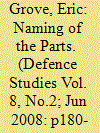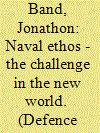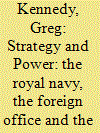| Srl | Item |
| 1 |
ID:
082454


|
|
|
|
|
| Publication |
2008.
|
| Summary/Abstract |
The British historian and maritime strategist, Julian Stafford Corbett,
published
The Campaign of Trafalgar
in 1910. The book presents a complex
account of the political, diplomatic and military campaign that resulted in
defeat for the combined French-Spanish fleet and the death of Nelson.
Corbett made a compelling, and at the time quite controversial, argument
that Nelson's real genius was not the tactical mastery that was displayed on
21 October 1805 but his understanding of the strategic context of his
command and why this was the key lesson for his contemporary professional
audience.
|
|
|
|
|
|
|
|
|
|
|
|
|
|
|
|
| 2 |
ID:
082455


|
|
|
|
|
| Publication |
2008.
|
| Summary/Abstract |
This article examines a little-known part of Julian Corbett's
Some Principles
of Maritime Strategy
(1911), the 'Theory of the Means' and compares it to thecontemporary designations of British warships. These underwent great
change in 1887, being named according to the ship's function (e.g. 'battleships'
and 'cruisers') as opposed to the previous approach of naming them
according to technological characteristics. This decision resulted from
changes in technology and in naval doctrine and strategy. The article
discusses Corbett's views about the battleships and cruisers of his time, and
concludes that the modern Royal Navy could usefully return to his
approach of designating warships
|
|
|
|
|
|
|
|
|
|
|
|
|
|
|
|
| 3 |
ID:
082453


|
|
|
|
|
| Publication |
2008.
|
| Summary/Abstract |
This article reproduces the address given at the formal September 2007
launch of the Corbett Centre for Maritime Policy Studies. It explores the
challenges of promoting an ethos that must be closely tied to the society
from which the Royal Navy recruits but which must also be in some ways
distinct, due to the unique warfighting role of the armed forces. This ethos
is central to the Royal Navy's ability to perform its required roles in Afghanistan
and Iraq, as well as in its other, widely ranging responsibilities ranging
from warfighting to peace support and humanitarian operations. The
central elements of this ethos are moral and physical courage, teamwork
and, in particular, leadership
|
|
|
|
|
|
|
|
|
|
|
|
|
|
|
|
| 4 |
ID:
082457


|
|
|
|
|
| Publication |
2008.
|
| Summary/Abstract |
When new technologies arise, there has been a tendency to focus on the
threat that they pose to naval power in general and surface warships in
particular. This trend can be seen with the response to torpedo boats in the
late nineteenth century, air power between the two world wars, nuclear
weapons and anti-ship missiles. A combination of the direct threat from
enemy capabilities and the competition from new elements of the armed
services has repeatedly resulted in claims that warships or even naval power
itself had become obsolete. This article explores the debates surrounding
these technological innovations. It argues that their impact was so misunderstood
because of a lack of appreciation of the ability of navies to adapt
and incorporate new technologies and the continuing importance of the use
of the sea.
|
|
|
|
|
|
|
|
|
|
|
|
|
|
|
|
| 5 |
ID:
082456


|
|
|
|
|
| Publication |
2008.
|
| Summary/Abstract |
Conventional wisdom, and much of the existing literature, puts the Royal
Navy at the centre of Britain's World War I blockade strategy. This article
argues that such was not the case. While operationally the RN was
central, strategically it was the Foreign Office that controlled the strategic
direction of the blockade. Indeed, given the political dimensions of any
blockade it is questionable that any such activity is ever the sole domain of
a navy. Relying on primary sources this article highlights competing
strategic frictions that existed in the British comprehensive approach to
formulating a viable blockade strategy, how they were overcome, and
what costs such
|
|
|
|
|
|
|
|
|
|
|
|
|
|
|
|